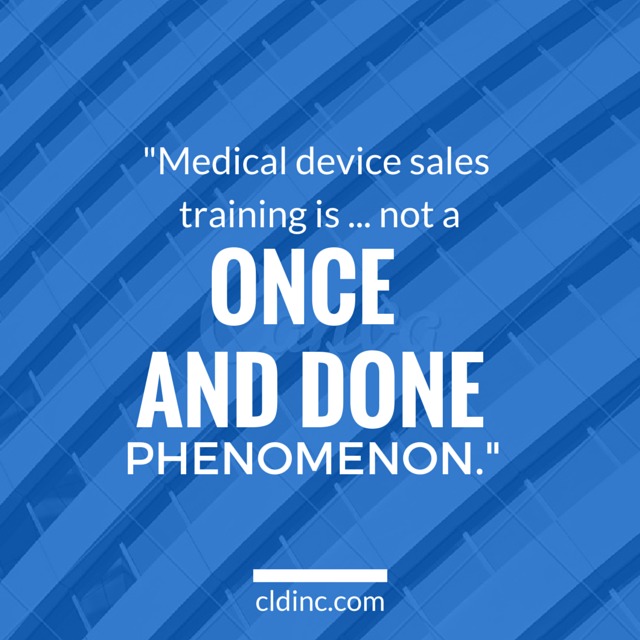Medical device sales and related training objectives are unique and can be complex. Ideally, every medical device sales rep would have the opportunity to be immersed in multiple aspects of the business they work for and every trainer would spend time in the field to better understand what it’s like for reps. But since this isn’t practical for most businesses, trainers and reps have to rely on certain best practices in medical device sales training. Here are 7 things medical device sales training should include.
1. Mobility
If you’re not taking advantage of the mobile revolution to improve medical device sales training, you’re falling behind. Mobile devices offer a huge new opportunity for transfer of knowledge since reps have them on hand essentially all the time. But you can’t simply shoehorn your existing training program onto another platform and expect success. What may work great on a laptop may be frustrating on a tablet or phone. You have to prioritize which information is most critical for reps to access on their devices and create training modules that work well with mobile hardware.
2. Smaller, “Snack Sized” Training Modules
Expecting reps to use their iPads to watch an hour-long training video when they’re in the field is unrealistic. A better approach for today’s mobile reps is to provide smaller, more digestible chunks of training information that lend themselves to perusal while a rep is between sales calls, for example. You don’t have to rely on mobile devices and apps for all your medical device sales training, but they should be included, and content should be scaled in scope to suit the devices and how they’re used.
3. Attention to Product Documentation Details
Standards for medical devices are exacting and demanding, and your reps have to have an encyclopedic knowledge of the products they sell and the regulations governing them. Not only is such knowledge critical to the sales process, but it is invaluable should a product be recalled and demand made for documentation that all regulations have been followed.
4. Avoidance of the Strong Sell
With medical device sales, reps don’t have to spend as much time educating clients about the benefits of their products, because customers tend to already know, for example, what an oxygen monitor is for. Rather, reps must keep customers informed about the latest models, pricing, and value propositions. The “strong sell” approach can come across as condescending in a medical sales environment, and medical device sales training should make reps aware of this risk.
5. Honesty and Transparency
Of course, honesty and transparency are critical to any type of sales, but when reps are selling within a high-competency industry like biotech, they can count on customers being knowledgeable and seeing through any gimmicks. Medical device sales training has to emphasize the roles of honesty and transparency in providing customers with the information they need, because without them long-term success is impossible.
6. Respect for Clients’ Time
The people who make purchasing decisions about medical devices are constantly pressed for time, so medical device sales training has to show reps how to build client relationships while respecting their time and avoiding time-wasters like going to sales calls unprepared or not following institutional policies concerning access to decision makers.
7. Long-Term Continuity of Training
Sales and technical skills can go stale if they’re not refreshed regularly. While everyone expects new reps to undergo significant training, less priority may be placed on refresher training for established reps. This can be short-sighted, because technology changes, medical practices change, and the laws and regulations that apply to medical device sales change. Medical device sales training is a long-term commitment, not a “once and done” phenomenon.
Medical device sales are highly specialized, and medical device sales reps have to undergo much more extensive training than other sales professionals. That training should involve the use of mobile devices, should be provided in convenient modules for learning on the go, and should include attention to the importance of product details and regulations. It should also include information on how to avoid off-putting “strong sell” techniques and emphasize honesty and transparency.
A key to successful training is keeping things fresh and relevant. This can be accomplished with the use of various techniques and strategies. Print materials, e-learning materials, mobile training modules, and even exciting new approaches like gamification can help sales trainers develop teams that achieve results in the field with outstanding skill and professionalism. Contact us online to learn more about successful training ideas.






